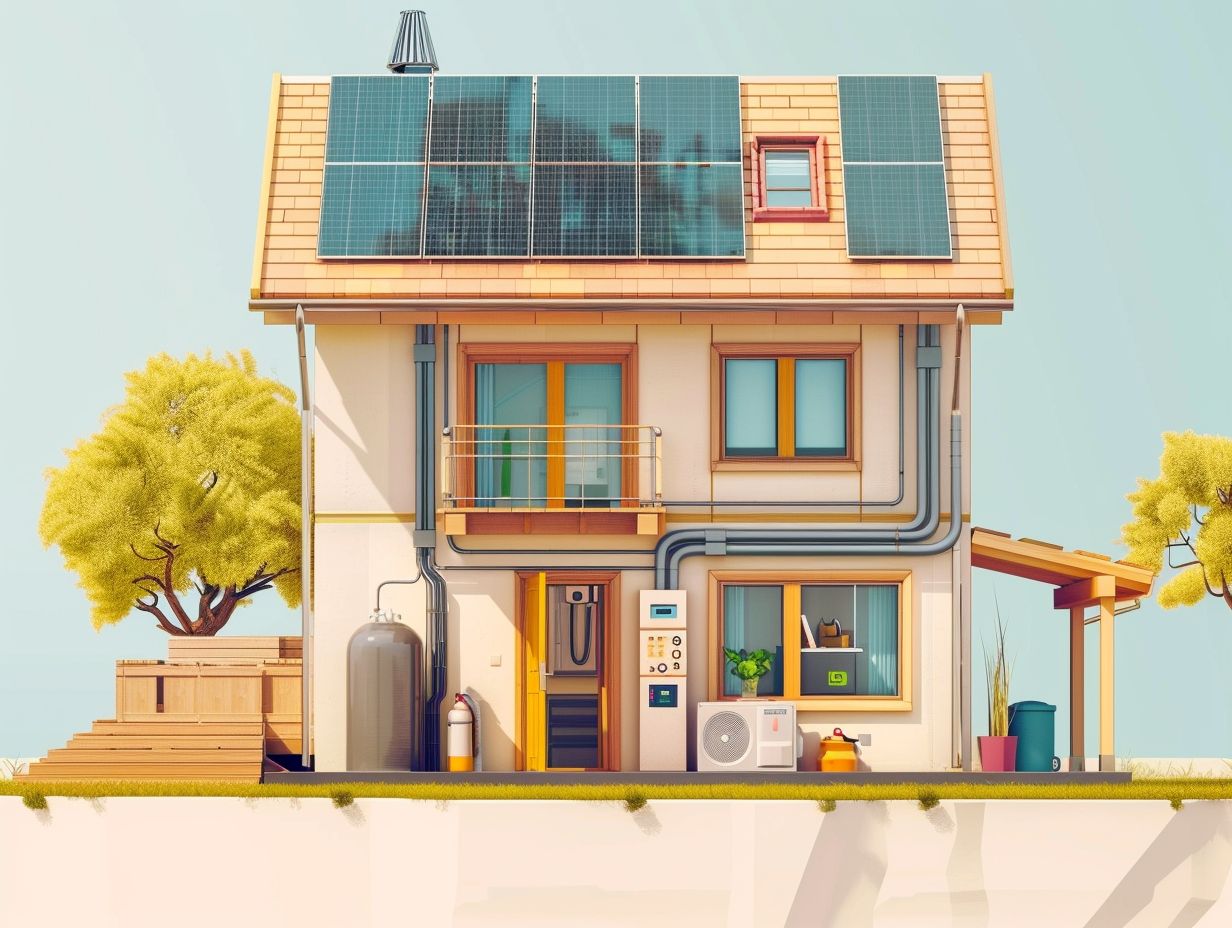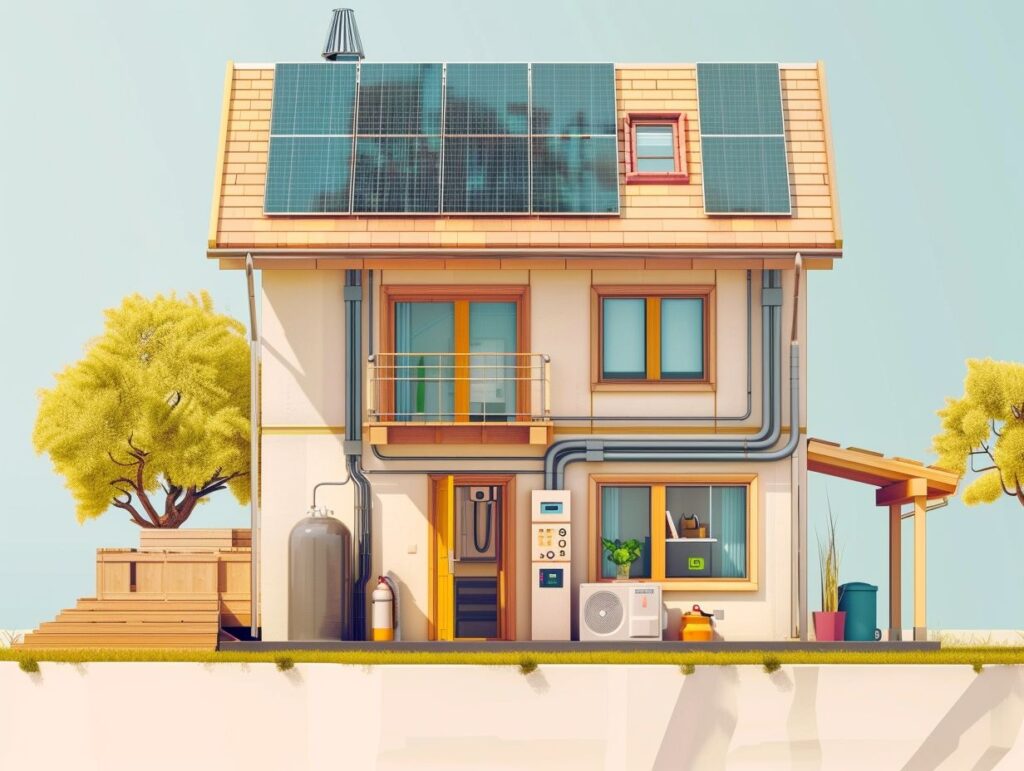If you are interested in reducing your home’s carbon footprint, electric heating could be a solution worth considering. This article will delve into the concept of carbon footprint, the influence of home energy consumption, and the advantages of electric heating in terms of carbon emission reduction and cost savings.
Various types of electric heating systems will be examined, along with guidance on how to integrate them into your home. Additionally, stay tuned for further tips on energy-saving techniques to effectively diminish your home’s carbon footprint.
Key Takeaways:
 1.
1.
- Electric heating can greatly reduce a home’s carbon footprint by decreasing carbon emissions from traditional heating sources.
- In addition to being environmentally friendly, electric heating can also provide cost savings and increased efficiency for homeowners.
- There are multiple types of electric heating systems available, each with their own benefits and considerations. It is important to carefully compare and choose the best option for your home.
Understanding Carbon Footprint in Homes
Understanding the carbon footprint in your home involves analysing the impact of various home energy sources and consumption habits on greenhouse gas emissions.
It is crucial for homeowners to assess their energy usage and heating systems to reduce their carbon footprint and contribute to environmental sustainability.
Different heating systems, such as electric, natural gas, and oil, play a significant role in determining the amount of CO2 emissions produced. Opting for energy-efficient heating solutions like heat pumps or solar heating can greatly reduce your carbon footprint.
Government initiatives promoting renewable energy sources, such as solar panels or wind turbines, are gaining momentum to further decrease reliance on fossil fuels.
Proper insulation of homes also plays a key role in conserving energy and reducing greenhouse gas emissions, making it essential for sustainable living.
What is Carbon Footprint?
The carbon footprint represents the total amount of greenhouse gases, primarily CO2, produced directly or indirectly due to human activities. In the context of homes, your carbon footprint is influenced by the type of heating systems you use, energy efficiency measures, and insulation levels.
The choice of heating methods in your residence plays a significant role in determining the carbon emissions. For instance, traditional heating systems like fossil fuel-based furnaces can lead to a higher carbon footprint compared to modern alternatives such as heat pumps or solar heating.
Proper insulation helps in reducing the energy consumed for heating or cooling, thereby lowering the overall carbon emissions associated with residential energy consumption.
Emphasising energy efficiency through practices like using programmable thermostats and LED lighting can further minimise your carbon footprint. Incorporating renewable energy sources like solar panels or wind turbines can significantly contribute to reducing the carbon footprint of your household.
Impact of Home Energy Use
Your home energy consumption has a significant impact on climate change due to the use of fossil fuels and electricity generation.
The choice of heating systems, whether it be electric heating, heat pumps, gas boilers, or hybrid heating, directly influences your carbon footprint and the environmental sustainability of your household.
Consider opting for renewable energy sources, such as solar panels, wind turbines, or geothermal systems, as they can effectively reduce greenhouse gas emissions associated with home heating. By embracing clean energy, you not only decrease your environmental impact but also save on energy expenses in the long term.
Transitioning to these eco-friendly alternatives represents a crucial pathway towards a more sustainable and environmentally friendly future, benefiting both individuals and the planet as a whole.
Benefits of Electric Heating
Electric heating offers you numerous benefits, such as sustainability achieved through the utilization of renewable energy sources like air-source heat pumps, improved energy efficiency due to the incorporation of smart thermostats, and an overall decrease in carbon emissions when compared to conventional heating systems.
Electric heating systems provide you with the advantage of being highly responsive and easily controllable, enabling you to adjust the temperature precisely to your liking.
This level of flexibility not only ensures your comfort but also leads to cost savings by optimising energy consumption. Smart technologies play a vital role in this regard, allowing you to remotely monitor and adjust your heating systems, thereby enhancing efficiency.
The environmental advantages of electric heating go beyond just reduced carbon emissions; they also eliminate the need for fossil fuels, ultimately reducing air pollution and dependence on non-renewable resources.
Reducing Carbon Emissions

Reducing carbon emissions in your home is achievable through the adoption of low-carbon heating solutions such as electric heating powered by renewable energy sources. These energy-efficient heating systems play a crucial role in mitigating climate change and lowering your household carbon footprint.
To enhance the sustainability of your living space, consider investing in energy-efficient appliances and improving insulation. Incorporating smart thermostats and implementing effective zoning techniques can optimise energy usage, reduce waste, and minimise emissions.
Transitioning to heat pump systems and solar panels can significantly decrease your reliance on fossil fuels, contributing to a greener environment.
Promoting awareness about energy conservation practices and offering incentives for eco-friendly initiatives can motivate more households to embrace sustainable heating solutions. By taking these steps, you can contribute to a more environmentally friendly and energy-efficient home.
Cost Savings and Efficiency
Electric heating not only offers environmental benefits but also leads to cost savings for homeowners through reduced energy bills. The efficiency of electric heating systems contributes to lower energy consumption and overall savings while also minimising heating emissions.
The shift towards electric heating aligns with the growing trend of renewable energy adoption, which holds promising long-term economic benefits.
By harnessing electricity from sustainable sources like solar or wind power, you can not only reduce your carbon footprint but also potentially save more on heating costs in the future.
The advanced technology in electric heating systems ensures precise temperature control, further enhancing energy efficiency and providing a comfortable living environment while enjoying the financial advantages of reduced energy bills.
How to Implement Electric Heating in Your Home?
When implementing electric heating in your home, careful planning is essential. From the installation process to ongoing maintenance, optimising energy use is key. By incorporating energy-efficient practices and utilising smart thermostats, you can further enhance the effectiveness of your electric heating system.
During the installation phase, it is crucial to consult with a professional to ensure the system is set up correctly and efficiently. Proper insulation of your home also plays a vital role in reducing heat loss and maximising the efficiency of your electric heating system.
Regularly cleaning and replacing air filters, checking for any leaks or damage, and calibrating thermostats are essential maintenance tasks to keep your system running smoothly and efficiently.
Installation and Maintenance Tips

In terms of the proper installation and maintenance of electric heating systems, you need to consider factors such as insulation levels, ventilation for air conditioning, and the potential integration of renewable energy sources like wind turbines. These tips are crucial for optimising the efficiency and lifespan of your heating infrastructure.
It is imperative to prioritise proper insulation to ensure that heat remains within the designated spaces, thereby decreasing energy waste and cutting associated costs. Additionally, maintaining effective air conditioning is essential for regulating indoor temperatures and air quality.
Incorporating renewable energy sources, such as wind turbines, into your system can further bolster sustainability and reduce reliance on traditional energy sources.
Regular maintenance, which includes tasks like cleaning filters and monitoring performance, is vital for ensuring that your system functions at its peak efficiency. This not only promotes a comfortable indoor environment but also contributes to a more environmentally friendly living or working space.
Other Ways to Reduce Home Carbon Footprint
Along with adopting energy-efficient heating systems, there are several additional measures you, as a homeowner, can take to reduce your home’s carbon footprint. Addressing factors such as carbon emissions, energy bills, and overall environmental impact can lead to a more sustainable living environment.
One effective way for you to lower carbon emissions and energy bills is by improving insulation in your home. Ensuring that walls, windows, and doors are properly sealed will help you reduce heat loss in the winter and maintain cool air inside during the summer.
Incorporating energy-efficient appliances, such as fridges, washing machines, and dishwashers, can also significantly decrease your electricity consumption.
By making small changes in your daily habits, like switching off lights when not in use and using natural light whenever possible, you can contribute to a greener household and help minimise the environmental impact of your daily activities.
Additional Energy-Saving Measures
Implement insulation upgrades, embrace energy-efficient appliances, and transition from traditional heating methods to significantly contribute to combating climate change and reducing reliance on fossil fuels. These energy-saving measures play a vital role in enhancing household sustainability.
By ensuring that your home is properly insulated, you can minimise heat loss during colder months, leading to reduced energy consumption and lower utility bills.
Energy-efficient appliances, such as fridges and washing machines, are designed to operate more efficiently, using less electricity and decreasing overall energy usage. Transitioning to these modern appliances not only saves money in the long run but also helps in decreasing carbon emissions.
This shift away from traditional heating practices not only benefits the environment but also promotes a more sustainable lifestyle for future generations.
Frequently Asked Questions
Can electric heating actually reduce my home’s carbon footprint?
Yes, electric heating can significantly reduce your home’s carbon footprint as it produces zero emissions compared to traditional heating methods such as gas or oil.
How does electric heating contribute to reducing carbon footprint?

Electric heating uses renewable sources of energy such as solar, wind, or hydropower to generate heat, which reduces the amount of carbon emitted into the atmosphere.
Is electric heating cost-effective in reducing carbon footprint?
Yes, electric heating can be cost-effective in reducing carbon footprint as it requires less maintenance and has lower operating costs, resulting in long-term savings.
Can I use electric heating in older homes to reduce carbon footprint?
Yes, electric heating can be installed in older homes as it does not require any major renovations, making it a feasible option for reducing carbon footprint in older homes.
What are some benefits of using electric heating to reduce carbon footprint?
Some benefits of using electric heating to reduce carbon footprint include better air quality, energy efficiency, and reduced reliance on fossil fuels.
Are there any government incentives for using electric heating to reduce carbon footprint?
Yes, many governments offer incentives such as tax rebates or grants for households that switch to electric heating to reduce their carbon footprint. It is worth checking with your local government for any available incentives.

